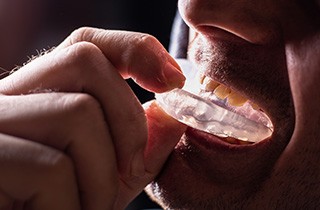Dental Implants – DFW Metroplex
The Gold Standard of Modern Tooth Replacement

Dental implants have changed the way our DFW Metroplex team replaces missing teeth. Rather than just replace a tooth’s crown, they let us replace roots and crowns alike for more natural-looking results. That means they can “bring back” any number of missing teeth – from a single tooth to an entire arch! So, reach out and book a consultation if you want a full smile again. We have many convenient locations across the Metroplex, including Dallas, Arlington, Mesquite, and other communities.
Why Choose Bear Creek Family Dentistry for Dental Implants?
- Dental Implant Placement Done Entirely In-House
- A Team of Experienced Specialists
- Multiple Options Available for Making Dental Implants Affordable
What Are Dental Implants?

Dental implants are small, durable posts made of titanium. Dentists design and use them to replace the crowns and roots of missing teeth.
Dental implants have a unique placement method compared to dentures or dental bridges. Each is set directly in the jaw’s empty sockets instead of over the gums. Given their material, the implants then fuse with your jawbone and become permanent parts of your mouth. They’ll then be able to support their abutments (i.e., metal connectors) and final restorations.
The 4-Step Dental Implant Process

Dental implants are the best tooth replacement option out there. Since they replace the roots of the missing teeth, they allow for many benefits, including additional stability, longevity, and comfort. To achieve this, getting dental implants requires a multi-step process that takes place over the course of several months. Everyone’s treatment looks a little bit different, but here are the four main steps everyone can expect.
Initial Dental Implant Consultation

The first step when getting dental implants is to attend a consultation. During this time, we will examine your smile to see if you are a good candidate for the treatment. Some patients need preliminary procedures, like gum disease treatment or bone grafting, before they can get dental implants. If this applies to you, we will help you get them scheduled. Once your gums and jaw are in good shape, we can move onto planning the rest of your treatment.
Dental Implant Surgery

Getting dental implants requires a surgical procedure. We complete this procedure in-house, so you don’t need to worry about working with an outside doctor at a separate location. After numbing the area with a local anesthetic, an incision is made in the gum tissue. Then, the dental implants are placed at strategic angles for optimal support. Lastly, the gums are closed, and protective caps are placed over the ends of the implants to keep them safe for the next few months.
Dental Implant Osseointegration & Abutment

Over the next three to six months, your dental implants will fuse to your jawbone in a process called “osseointegration.” This is what gives your replacement teeth so much stability and strength. Once the area has healed, you will need to undergo another minor procedure where abutments are attached to the ends of your dental implants. Impressions are taken and sent to the dental lab so your restoration can be crafted.
Delivery of Dental Implant Restorations

Once your restorations are ready, you can return to our practice. We’ll attach your replacement teeth to your dental implants via the abutments. If everything looks and feels great, you will be sent on your way to show off your beautiful, complete smile!
The Benefits of Dental Implants

With our practice’s dental implants, you’ll enjoy upsides like:
- A Gorgeous Grin – Dental implants are capped with porcelain, so they blend well with your smile. Most folks won’t even notice that they aren’t “natural.”
- A Younger Face – Dental implants stimulate your jawbone, ensuring your face stays full and youthful.
- Easier Eating – As dental implants restore your bite force, they let you chew your favorite tough foods.
- Long-Lasting Results – With daily care, dental implants can last twenty years or more.
Who Dental Implants Can Help

Almost any adult can qualify for dental implants, whether they’ve lost one tooth or many. The metal posts can just as easily fill large smile gaps as small ones. That said, a patient will need healthy gums and a dense jawbone to be a good candidate. These traits make your mouth strong enough to support placed implants. If you lack them, the implant posts will come loose and quickly fail.
Missing One Tooth
If you only lack one tooth, one dental implant and a crown is enough. This pair of prosthetics should restore your smile longer than a dental bridge would. As a bonus, the implant and crown won’t alter your nearby teeth. An implant post only needs to fuse with your jaw to stay secure.
Missing Multiple Teeth
An implant bridge is the ideal option when you’re missing several adjacent teeth. Unlike a regular one, this device uses dental implants instead of crowns. That means placing it doesn’t require any alterations to your nearby natural teeth (i.e., abutments). Instead, the treatment won’t do anything to your existing enamel.
All that said, a partial implant denture may work better when the missing teeth aren’t adjacent.
Missing All Teeth
For more extensive tooth loss, patients will need four to six dental implant posts to support a partial or full denture. Like their traditional, removable counterparts, implant-supported prosthetics are crafted using a gum-colored base to support any number of replacement teeth. We use the minimum number of implants possible to achieve adequate support.
Understanding the Cost of Dental Implants

Make no mistake, dental implants are considered “the gold standard” of tooth replacements for a reason. But some patients do hesitate because of the costs. That’s only natural – you don’t want a treatment to exceed your budget! Rest assured, your implant dentist in Dallas will make your treatment as affordable as possible, walking you through the factors that affect the final price. Our team will also explain how dental insurance can apply or how flexible financing can make your payments more manageable.
Preliminary Treatments & Dental Implant Surgery

Preliminary treatments like bone grafting and gum disease therapy can add to your overall treatment costs, and are typically separate from dental implant surgery. However, they’re well worth the price, as they’ll ultimately promote the success and longevity of your dental implants.
The Parts of Your Dental Implant

While the materials and brands of the dental implant post and abutment can affect their price tag, the part that will likely have the most impact on your expenses is the final restoration. This is the crown, bridge, or denture that will be attached to your dental implants and complete your smile. Smaller scale restorations (like crowns) tend to be less costly than larger scale restorations (like implant dentures).
How Dental Implants Can Save You Money

Over time, many patients find that they actually save money because of their dental implant restoration. Implant crowns, bridges, and dentures last much longer on average than their more traditional counterparts, and are also known to be more durable. Compared to cheaper alternatives, you’ll likely spend less on repairs, replacements, and frequent trips to the dentist.
Plus, since dental implants preserve your jawbone and prevent deterioration, you could also avoid treatment costs related to jawbone loss.
Does My Dental Insurance Cover Dental Implants?

Sort of. Coverage can vary from plan to plan, but most dental insurance policies offer partial coverage for dental implant treatments. You may have benefits that can be applied to the costs involved in preliminary treatments, dental implant surgery, or your final crown, bridge, or denture. To know for sure, it’s best to contact your dental insurance provider or one of our friendly team members.
Making Dental Implants Affordable

We understand that not everyone has access to dental insurance. If you’re uninsured, we can help you apply for CareCredit or Sunbit flexible financing. The goal of these monthly payment plans is to break your total treatment costs down into smaller, more manageable chunks. Many CareCredit and Sunbit plans come with little-to-no-interest, so you can pay at your own pace without worries.
Maintaining & Caring for Your Dental Implants

Congratulations on your new dental implants! These amazing restorations have the potential to keep your smile complete, strong, and healthy for a lifetime. However, that’s only if you take care of them! Unfortunately, if you don’t protect your dental implants from damage and infection, they could fail or need to be replaced. However, the good news is that with a few simple precautions and healthy habits, you’ll likely be able to enjoy your newly rebuilt smile for the rest of your life!
Make Oral Hygiene a Priority

The great news about dental implants is that unlike your real teeth, they can’t get cavities. But you still need to protect them and any remaining teeth with excellent oral hygiene. Problems like gum disease can cause your teeth and your dental implants to fail. To that end, be sure you are brushing your teeth twice a day with a soft-bristled toothbrush and non-abrasive toothpaste and flossing daily.
Eat a Healthy Diet

Another amazing perk of dental implants is that you can use them to eat a full diet. However, be careful with the foods you select. Overindulging in things that are too hard, sugary, or sticky can damage your prosthetics. Instead, opt for foods that are rich in calcium and vitamin C, as these will keep your jawbone strong and your gum tissue healthy.
Break Bad Habits

Bad habits can be hard to break, but things like smoking, vaping, and chewing tobacco can cause your dental implants to fail or become damaged. They also slow the healing process and leave your mouth vulnerable to infection. Furthermore, be sure to never use your teeth (both real and prosthetic) as tools, as this can also damage them.
Protect Your Dental Implants

While it’s true that your dental implants are strong, they’re not indestructible. Thus, if you play sports or grind your teeth, speak to your dentist about having a custom mouthguard made. This will protect your implants and teeth from excessive wear and tear as well as accidental injury that could cause them to fail.
Schedule Regular Dental Checkups

Finally, be sure to visit your dentist for regular cleanings and check-ups every six months. This way, he or she can monitor your dental implants, as well as keep an eye out for any potential issues. Early intervention is essential to protecting your newly rebuilt smile, and we want to ensure you can enjoy it for a lifetime!
Dental Implant FAQs
How Long Do Dental Implants Last?
The lifespan of dental implants depends on the health and lifestyle choices of the patient. To ensure that dental implants last, be sure to brush, floss, and rinse with mouth daily. Attend dental checkups and cleanings regularly. You should avoid chewing on anything too hard or ripping through packaging with your teeth. Smoking has also been linked to dental implant failure. When cared for properly, dental implants can last upward of 30 years! This is several times longer than traditional bridges and dentures.
Does Getting Dental Implants Hurt?
Your mouth will be numbed with a local anesthetic before the procedure begins. The jawbone also doesn’t have very many nerve endings. Ultimately, you shouldn’t feel any pain. You may experience some soreness for a few days afterward, but this can be managed with your over-the-counter pain relievers. Cold compresses can also be helpful. If your discomfort worsens, give us a call!
Are Dental Implants Safe?
For most patients who have adequate oral health, dental implants are highly successful when placed by a qualified professional. If you have low jawbone density or gum disease, we can address these issues with preliminary procedures, like gum disease treatment and bone grafting. This can help to make dental implant surgery safer and more successful. If you have diabetes, cancer, or other medical conditions that could make surgery risky, we will discuss them during your consultation so we can plan accordingly.
Am I Too Young to Get Dental Implants?
Most dental professionals will not place dental implants in patients who are younger than 18. This is because most people’s jaws aren’t completely developed until young adulthood. If dental implants are placed before the jaw has finished growing, they could interfere with bone development, potentially resulting in serious complications. During your consultation with us, we will discuss whether or not dental implants are the best option for you at this time.
Will I Have to Take Off Work for Dental Implant Surgery?
Most patients only need to take one or two decays off to get dental implants. If your job is physically demanding, you should probably take at least three or four days off. This is because heavy exercise can divert blood from the implant site and delay healing. Just keep in mind that every care is different. During your consultation, we will be able to give you a more specific recommendation for your unique case.
